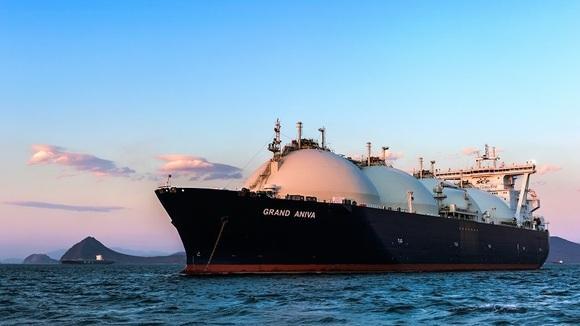
LNG: BIGGER NO BETTER

For Qatar, the world's largest exporter of LNG, preparing for a looming glut of the fuel isn't about being the biggest seller. It's about being the most efficient.
Global LNG output is expected to rise by a third to about 330 million metric tons annually by 2018, according to Sanford C. Bernstein & Co. Most of the new fuel will come from the U.S. and Australia, which is poised to topple Qatar as the biggest supplier. Unlike Saudi Arabia, the largest oil shipper, Qatar won't be fighting for market share at the expense of earnings.
Instead, the sheikdom will continue as one of the most profitable LNG sellers by taking advantage of the industry's lowest production costs and a control over supply routes that lets it redirect LNG quickly between continents to exploit opportunities, said Ibrahim Ibrahim, vice chairman of Ras Laffan Liquefied Natural Gas Co., known as RasGas.
"A lot of people have gas, but we have an integrated project," he said in an interview in Doha. "We are not trying to maintain a leadership role."
The Persian Gulf nation faces a challenge similar to the one Saudi Arabia has grappled with in oil markets, as competitors take market share and drive down prices, according to a Nov. 13 report by the Arab Gulf States Institute in Washington, a research center. Prices for LNG delivered to Asia have plunged more than 60% from a record in 2014.
Better Terms
Buyers such as Tokyo Electric Power Co. and South Korea's Chubu Electric Power Co. are haggling for better terms.
"Most of the long-term prices will expire around 2020," Chung Yangho, South Korea's deputy minister of energy and resources policy, said on Nov. 9 in Doha. "If the oversupply continues, we hope to see there will be less rigid market conditions."
Qatar shipped 76.4 million tons of the fuel in 2014, or 32% of global supply, according to the International Group of Liquefied Natural Gas Importers.
"Spending billions to build new LNG plants doesn't make sense as new supplies come online," said Allison Wood of consultants Control Risks Group Ltd. "The fact that Qatar owns the value chain from start to finish allows it to have a level of efficiency that is going to be tough for other producers to match."
U.S. Link
Instead of fighting expanding U.S. producers head-on, Qatar has joined them. It has a 70% stake in Golden Pass Products LLC, a venture with Exxon Mobil Corp. that's seeking U.S. regulatory approval to export from Texas. Qatar is already the biggest provider of LNG on the spot market, a departure from its traditional focus on long-term contracts.
Qatar took 10 years to become the fuel's largest producer in 2006 and even less time after that to build a $250-billion sovereign wealth fund. With a population of 2.4 million people, it tapped the third-biggest gas reserves to become the wealthiest nation per capita. Qatar's gross domestic product in 2014 was $134,182 for each resident compared with $49,537 in neighboring Saudi Arabia, with a population 12 times as large, according to the World Bank.
The Jamaica-sized country is currently the lowest-cost and most profitable producer of LNG, according to Neil Beveridge, an analyst at Bernstein. The break-even cost for RasGas to produce 1 million British thermal units of LNG is $1.60 compared with $7.60 in the U.S. and as much as $13.50 for Australian companies, according to reports by Columbia University's Center on Global Energy Policy and the Oxford Institute for Energy Studies.
Joint Ventures
RasGas, along with Qatar Liquefied Gas Co., known as Qatargas, operates 14 liquefaction plants in joint ventures between state-owned Qatar Petroleum and foreign partners including Exxon Mobil and Royal Dutch Shell Plc. RasGas can produce 35 million tons of LNG per year; Qatargas, 42 million. Through them and other investments, Qatar's government owns LNG tankers, stakes in receiving terminals and shares in international gas producers such as Shell and BG Group Plc.
With its control over production, liquefaction, transportation and import terminals, Qatar was able to move cargoes from Europe to Asia where LNG rates surged in 2011 after Japan switched off its nuclear power stations following the Fukushima disaster.
Amid today's lower prices, buyers locked into multi-year contracts of the type Qatar prefers are trying to negotiate for cheaper gas. Petronet LNG Ltd., India's biggest gas importer, bargained with RasGas for a discount of almost 50%, an achievement other buyers may try to emulate, Credit Suisse Group AG said in a Dec. 9 note.
The Petronet contract's revised terms amount to a $1.1 billion transfer of value from seller to buyer, Credit Suisse estimated in a separate note. Petronet shares rose 5% on Wednesday to the highest since at least March 2004, on optimism that the price cut will boost the importer's sales and profit, according to Bloomberg Intelligence analysts Charles Shum and Joseph Jacobelli.
"We are aware of the market change," RasGas's Ibrahim said. "We are in a good position. Nobody can compete with us."
-----
More:

